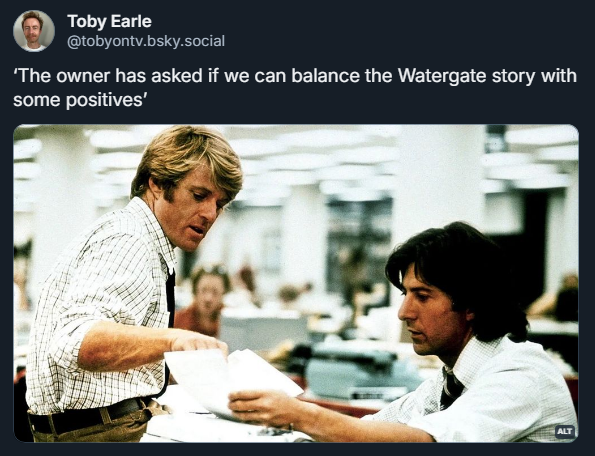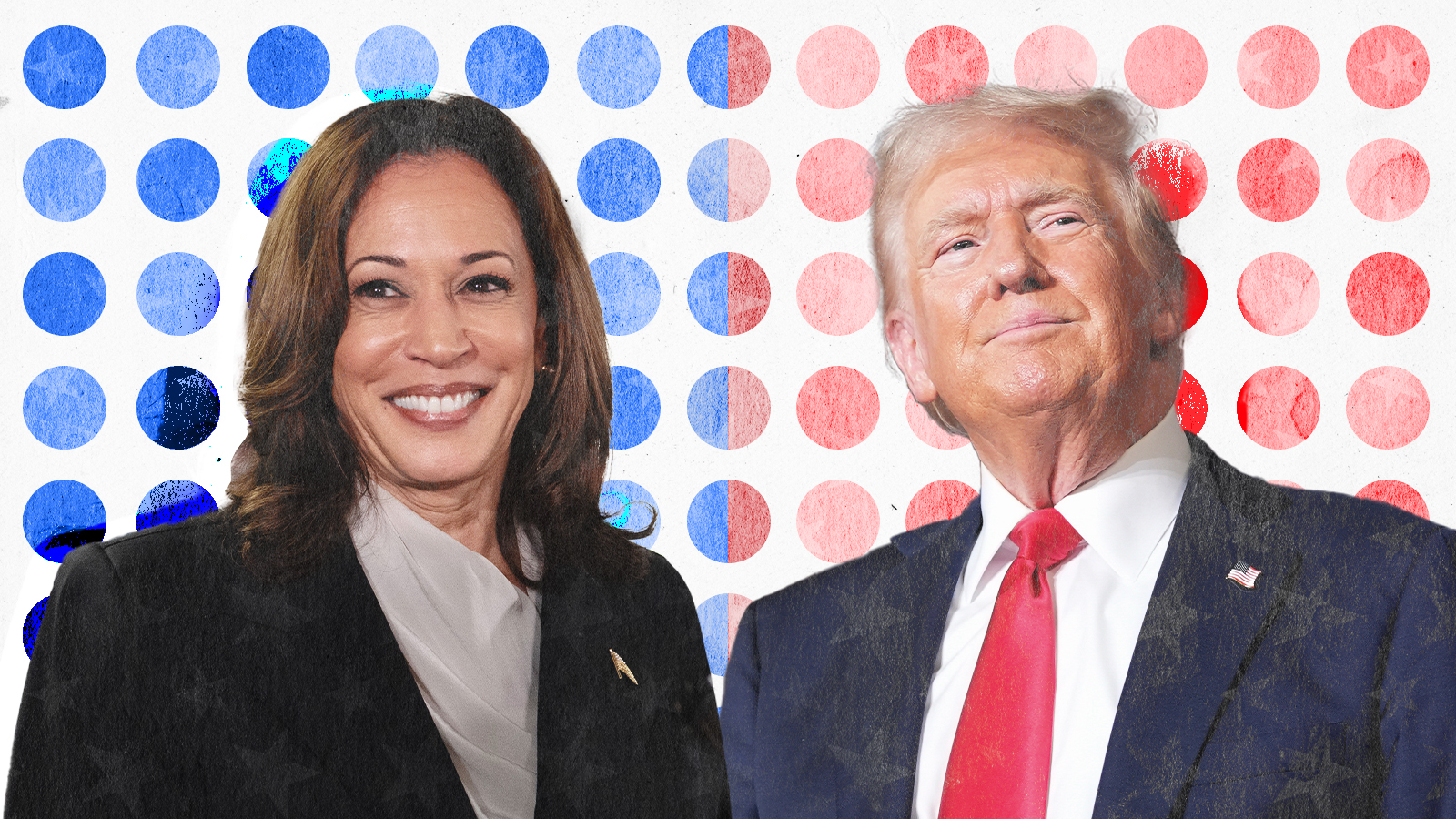I think for a lot of people, especially journalists who have been critical of the NYT and much of the mainstream press coverage of Trump it has less to do with personally wanting Trump to win either for financial reasons or being philosophically in tune with him as a whole but a toxic mix of factors that has been building within journalism for decades and which the NYT, as the paper of record, is the prime example of. The NYT has something like 11 million subscribers and has huge influence on other media. Yes that influence is declining, but that decline has its own consequences. This is a huge topic and people much more experience than I have written voluminously on the subject. I'll try to condense the various arguments and summarize the factors as briefly as I can:
1) As the mainstream press in general has begin to decline in prominence and, especially as ad revenue has declined, papers and outfits have struggled with how to cope. Many of found refuge with billionaire owners and yes this can be a source of tension. However, with the NYT in particular they have been more successful than most at maintaining and even growing a large subscription base. The NYT has certain ideas not only about how to appeal to the largest possible demographic but also to demonstrate independence from their subscribers who they see as left leaning.
2) While there may be some who see financial success because Trump is in the news, it can be more complicated than that. The NYT is a bastion of so-called "inside baseball" or "savvy" political coverage where sources tell them what is "actually" happening behind the scenes. However, this invariably focuses the writers and editors not on what is materially important for people to know, but what their sources think is materially important for people to know. And spend enough time cultivating those sources and they become a precious commodity. This process of cultivation can itself influence the thinking of editors and reporters, even sub-consciously: they're important to you so what's important to them is important to you. This can even lead to the idea that what a politician says they're doing in private to the journalist (or what a staffer source leaks) is more important than what they are actually doing in the public eye. This becomes almost the ability to hide what you're doing by doing it in plain site in front of everyone. By doing it in plain site, it's not what's "actually happening".
3) There has been a decline in public trust in journalism, especially from the right. This has led to decades of Republicans especially "working the refs". This is also coupled with a longstanding journalistic principle of being "neutral" or, more importantly, being seen to be so. We can see politicians complain about this idea for decades (though no doubt those same politicians happily took advantage of this when they weren't the ones on the receiving end). This is a huge topic with so many tendrils and consequences it would be hard to list them all and maintain a reasonable length post. Bottom line: the Republicans especially have found it very easy to manipulate the media coverage under guise of neutrality and as they have progressed off the cliff face of reality well ... if you're neutral rather than objective ... you have to follow them at least part of the way down. So if you're striving to hard not be "political" in your non-editorial section of the paper (and the editorial section is a whole other problem with this), you end up being very political because an "balanced" coverage of events according to neutrality is actually quite unbalanced with reality. An example of this is "sane-washing" Trump or talking seriously about mass deportations as a housing policy but not as a human policy.
4) One of them consequent to 3 (and 1) is a certain defensiveness to criticism. The NYT famously got rid of a public editor (basically someone pseudo-employed by the paper but who was outside of the paper's normal hierarchy and whose main job was to focus on what the paper did right and wrong and write about that). At the time they wrote that with the rise of social media that they didn't need one because the public would tell them directly. But see point 1, they want to be "independent" from their "liberal readers". They also see criticism from both sides as proof that they are doing the job right. They feel the need to defend themselves because to admit wrong doing would admit their entire premise of how journalism should be conducted is wrong and that would be their life's work. They are also arrogant, especially the NYT. "How can than have made any mistakes? We're the best!" The NYT has categorically refused to admit that maybe its 2016 coverage wasn't the best and criticism of it has has led them to double down - almost like a toddler's oppositional defiance. This can also lead them to being petty and vindictive towards politicians who slight them, especially liberal ones who may feel much more pressure than conservative ones who the NYT knows give much less of a NYC rat's ass what the NYT thinks and even that being criticized by the NYT is a necessary part of being a conservative/Republican politician. Thus it isn't as effective to criticize them, thus the NYT doesn't partake in at as much as they should. As with points 2 and 3, being shameless is a super power.
This is not to say that there aren't explicitly Trump/Republican aligned people within these institutions and that those have an effect or of course entire such journalism outfits, e.g. Murdoch-owned ones. But this is a collection of some of the points, not an exhaustive one, e.g. the idea of politics as entertainment and a horse race wasn't even touched (and there are so many more), of "what's gone wrong" with journalism and media as a whole beyond that and why they've been putting their thumb on the scale while loudly proclaiming that they are not doing so. Naturally a conservative would dispute all of this, but frankly the proof is that Trump exists and continues to be able to operate in the media and political environment which is almost tailor-made for someone like him to succeed. In a healthy political and media environment, he'd been run out on a rail after his first press conference coming down the golden escalator. Of course, in a healthy legal environment, his wealth would not have shielded him from accountability for his fraud and in a healthy entertainment environment he would never have been propped up as a great businessman, which he isn't. Thus, he would never have been in a position to run. So of course many, many things had to go wrong from our politics to our legal system and our journalism media is just a piece of that, perhaps a reflection of the issues we face as a society - as I think I wrote once before in these forums, all of this above assumes our media should be better than us as a whole rather than distorted reflection of who we are or who we perceive ourselves to be. One of the main counterarguments, which you'll be shocked to hear I find wholly unsound from a philosophical, even causal, perspective, is that we the people elected him so "normalizing" him is just a reflection of what we already did. Again, completely backwards since the media was predominately responsible for creating the myth of Trump the businessman out of whole cloth in the first place and have been conditioned for years by that by points 1-4 and all the others I didn't get to (bonus point below).
5) This is really hard to write about and I'm less versed here, so I almost left it off, but I put it here at the end as a bonus section as I still think its important. For all the guff about the mainstream media being liberal and so forth, when it is liberal it is often a particular kind of liberal - the wealthy white male liberal - and when they try to bend over backwards to not appear liberal, its antithesis, rather than other modalities (never mind the wealthy white male conservative). Basically take the example of after Trump's victory in 2016 how much focus was on the supposed "forgotten" person who was white man in a midwest diner from the once-blue wall as opposed to after 2020's Biden's victory and the D's Senate upset the comparative lack of focus on the same people, but often black and female, in Georgia or the black belt (called so because of the farming not the people). This isn't because of necessarily explicit racism or sexism, but an inherent, reflex view of what's important based on the people who make up our journalistic institutions and its power structures. Actually minority voices are ... well ... a minority despite minorities slowly becoming a the majority and of course women making up more than half the population - but much less than that in positions of power and institutional culture has a way of shaping people, or perhaps filtering people, beyond personal identity.
Sorry for the long post, hope it was interesting.




